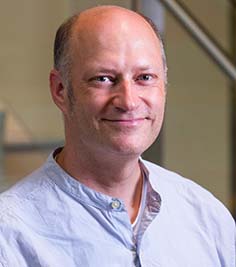Awards
- Bicentennial Medal - 2020
- Distinguished Professor - 2017
- National Academies - 2016
- American Academy of Arts and Sciences
- Titled Professor - 2006
- Chancellor's Professor of Psychological and Brain Sciences

Robert Goldstone completed his B.A. in Cognitive Science from Oberlin College and his M.A. in Psychology from University of Illinois at Urbana-Champaign. He received a Ph.D. in Psychology from the University of Michigan. Goldstone taught as a visiting scholar at Northwestern University, and as a visiting research fellow at the University of Glasgow, the University of Warwick, the University of Southampton, and the University College London. He joined Indiana University in 1996, and was named Director of the Cognitive Science Program in 2006. Goldstone currently serves as Chancellor's Professor in the Department of Psychological and Brain Sciences.
Goldstone is the foremost cognitive scientist working at the interface of perception and cognition and one of the world's premier cognitive psychology researchers. His research explores the nature of the cognition of learning, initially focused on basic mechanisms of cognition, concept learning, categorization and perceptual learning, and more recently focused on learning science with applications for the classroom. His work on perceptual learning focused on bidirectional interactions between lower-level perception and action skills and high-level cognition. His computational models of learning have been applied to science and math classrooms and his reputation in this area of expertise is at the highest level worldwide. Goldstone's advocacy for restructuring science education around cross-cutting scientific principles has accompanied his development of a tutoring system for arithmetic and algebra. The system, including the popular Algebra Touch edition, has sold more than 100,000 copies, and has been used in elementary, middle and high school classrooms, and online.
Goldstone's latest research moves beyond individual psychology into collective behavior and is focused on how group communication networks ought to be configured to maximize the group's likelihood of finding good solutions to problems and another area focuses on how groups self-organize to achieve outcomes. Applications of this work include the development of assistive technologies for maximizing team performance; incentive structures for improving group level performance; and models to predict social trends such as temporal patterns in baby naming, investments, and scientific progress. This area of research "is some of the most exciting work being done in cognitive science."
Goldstone's research has received more than $10 million in funding from the Department of Education, the National Science Foundation, and the National Institutes of Health and he has more than 250 publications in top journals. He was awarded two American Psychological Association Young Investigator awards, was the executive editor of Cognitive Science from 2001-2005, was elected as a fellow of the American Academy of Arts and Sciences (2016), the Association for Psychological Science (2007), the Cognitive Science Society (2006) and the Society of Experimental Psychologists (2004). These awards reflect his stature among the most creative and productive cognitive science researchers of his generation.
Goldstone received the IU Bicentennial Medal in September 2020 in recognition of his distinguished contributions to Indiana University.